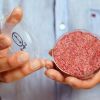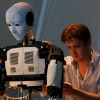-
 +4 +1
+4 +1Made in Space: Why Earth's Industries Might One Day Leave Our Planet
Taking our productive capabilities, and the search for the resources that powers them, to space might one day be an inevitability.
-
 +22 +1
+22 +1Boise restaurant goes vegan after owner sees graphic, ‘heartbreaking’ animal-rights film
It was past midnight when Maria Bahruth suddenly decided something that could make or break her small Downtown Boise restaurant. The High Note Cafe’s owner had gotten 15 minutes into watching “Dominion,” a graphic animal-rights documentary available on YouTube. Bahruth, who calls the 2018 Australian film “heartbreaking,” suddenly found herself baring her soul on the restaurant’s Facebook page.
-
 +33 +1
+33 +1The Challenge of Abundance: Boredom, Meaning, and the Struggle of Mental Freedom
As technology continues to progress, the possibility of an abundant future seems more likely. Artificial intelligence is expected to drive down the cost of labor, infrastructure, and transport. Alternative energy systems are reducing the cost of a wide variety of goods. Poverty rates are falling around the world as more people are able to make a living, and resources that were once inaccessible to millions are becoming widely available.
-
 +16 +1
+16 +1The future of food is farming cells, not cattle
We’ve become incredibly efficient at producing animal products for humans. Through innovations in animal husbandry, animals can be reared for meat and produce more milk and eggs faster than ever before. Dairy cows, for example, produce four times more milk than they did 75 years ago.
-
 +10 +1
+10 +1New Evidence That the World Really Is Getting Better
If you allow your perception of humanity to be shaped by the news, it is easy to lose sight of the narrative of human progress. Struggling democracies, suicide epidemics, climate change, and acts of violence are among the daily headlines that continue to overwhelm us with angst. It seems like every year is getting worse. Mainstream news channels are dominated by the idea that “If it bleeds, it leads.”
-
 +23 +1
+23 +1What Will You Eat When the World Ends?
How "preppers" are planning for the impending apocalypse — just don't expect them to share their food.
-
 +19 +1
+19 +1Meet Erica, the world's most human-like autonomous android (video)
Erica is 23. She has a beautiful, neutral face and speaks with a synthesised voice. She has a degree of autonomy – but can’t move her hands yet. Hiroshi Ishiguro is her ‘father’ and the bad boy of Japanese robotics. Together they will redefine what it means to be human and reveal that the future is closer than we might think.
-
 +14 +1
+14 +1New $150 gadget lets your smartphone detect cancer with laboratory precision
While smartphone spectrometers are already being used to help detect cancer, they have only been able to evaluate one sample at a time, making the work slow and tedious. A breakthrough by a Washington State University research team led to the creation of a low-cost multichannel smartphone spectrometer that uses optical sensors to scan multiple samples simultaneously. The team, led by Lei Li, assistant professor in the School of Mechanical and Materials Engineering, found their spectrometer to be highly accurate and sensitive, thanks to the custom prism array designed especially for this device.
-
 +21 +3
+21 +3In the Future, We Will Photograph Everything and Look at Nothing
"Today everything exists to end in a photograph,” Susan Sontag wrote in her seminal 1977 book “On Photography.” This was something I thought about when I recently read that Google was making its one-hundred-and-forty-nine-dollar photo-editing suite, the Google Nik Collection, free. This photo-editing software is as beloved among photographers as, say, Katz’s Deli is among those who dream of pastrami sandwiches.
-
 +20 +2
+20 +2What will the English language be like in 100 years?
The future is one of multiple Englishes. By Simon Horobin. (Nov. 10)
-
 0 +1
0 +1Cheap oil is taking shipping routes back to the 1800s
The Suez Canal was one of the most significant engineering projects of the 19th Century. It was a gargantuan task that took nearly 20 years to build and an estimated 1.5 million workers took part – with many thousands dying in the process. But when it finally opened in 1869, ships could travel from the Red Sea – between Africa and Asia – to the Mediterranean, cutting weeks off a journey. It was a revolution for trade.
-
 +35 +1
+35 +113 AI researchers reveal the amazing facts that blow their minds
Artificial intelligence researchers aren't easily impressed.
-
 +17 +1
+17 +1Noted futurist predicts disease-fighting computers as small as blood cells in 25 years
A famed futurist who foresees a day when and human and artificial intelligence merge and nanobots battle disease spoke to CBC's Duncan McCue about what lies ahead.
-
 +21 +2
+21 +2The Future of Art According to Hans Ulrich Obrist
There are few in the art world that see more, write more, or speak to more artists than Serpentine Galleries co-director Hans Ulrich Obrist. And, having literally written the book on curating, there are few better positioned to see what shape art will take in the future. So, what is the future of art according to Hans Ulrich Obrist? As he describes below: The Extreme Present.
-
 +40 +2
+40 +2The big data of bad driving, and how insurers plan to track your every turn
For years, insurance companies have used estimates of your annual mileage to determine your car insurance rates. But with recent changes in technology, insurers now have an unprecedented ability to judge your actual driving habits. Armed with detailed data on how often you slam on the brakes and what times of day you're on the road, insurance companies are increasingly relying on precise, technological means of assessing risk — and using that information to set your monthly premiums.
-
 +28 +3
+28 +3A Medieval Guide to Predicting the Year
It's January and you want to know how the year will go? You can use this handy guide, written by a 14th century Italian merchant, in which he offers what to expect throughout year, based on which day January 1st falls on.
-
 +22 +2
+22 +2This floating hotel can sail around the world thanks to its shapeshifting spine
This unique floating hotel stands to change the cruise industry. The MORPHotel is a vessel concept by engineer and architect Gianluca Santosuosso. The hotel is built around a flexible spine 1/2 mile long, that changes shape based on the ocean currents. It would slowly travel around the world, docking in cities to let passengers board or disembark.
-
 +20 +3
+20 +3The Predictions We Make Can Change How the Future Unfolds
The 130-year timeline of telephone innovation describes a relatively steady rise as the technology under the surface was continuously improved, with a handful of spikes for inventions such as the rotary dial, touch pad dialing, the fax machine, and, of course, 1959’s Princess phone. The changes were predictably predictable, the future rising in a fairly smooth incline.
-
 +21 +2
+21 +2Japan Pledges $10.6 bn for Climate Policies in Developing Nations
Japanese Prime Minister Shinzo Abe on Thursday promised to give $10.6 billion to developing nations by 2020 to help them implement policies against global warming, ahead of the U.N. climate talks in Paris next week. The decision to offer 1.3-trillion yen ($10.6 billion) came after Japan gave a roughly combined 2.0 trillion yen for the same purpose in 2013 and 2014.
-
 +24 +1
+24 +1Ray Kurzweil: We'll Become Godlike When We Connect Our Brains to The Cloud
Futurist Ray Kurzweil speaks at Singularity University about humans becoming more "godlike."
Submit a link
Start a discussion




















